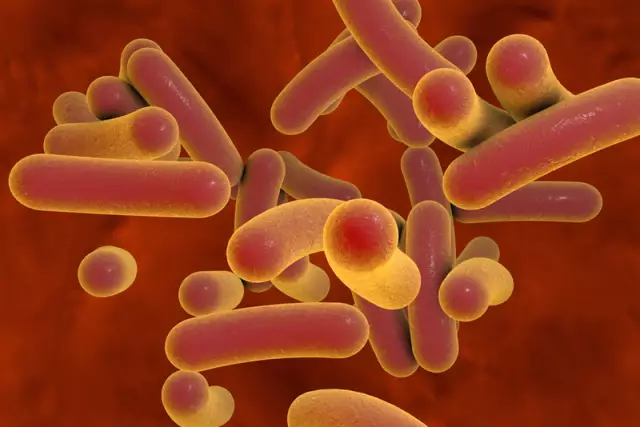- Author Rachel Wainwright wainwright@abchealthonline.com.
- Public 2023-12-15 07:39.
- Last modified 2025-11-02 20:14.
Reactive arthritis

Reactive arthritis is an inflammatory process in a joint that occurs against the background or after an acute infection. Most often it accompanies urogenital, intestinal or infectious diseases of the nasopharynx. Refers to seronegative spondyloarthritis, i.e. arthritis, in the event of which the rheumatic factor is not determined in the biochemical blood test.
The incidence rate for different pathologies is not the same. The following pathogens most often cause arthritis: enterobacteria, chlamydia, mycoplasma, salmonella, shigella, and some parasites.
The combination of arthritis, urethritis (cervicitis), conjunctivitis is called Reiter's syndrome.
Reactive arthritis is more common in men. People aged 20-40 years get sick with it more often than older people. Reactive arthritis in children is quite common.
The reason for the development of reactive arthritis
In most cases, reactive arthritis results from a specific immune response: cross-reactivity. In this case, the cells of the body's own body are recognized by the immune system as foreign and auto-aggression is directed at them - an inflammatory process occurs. This happens when the cells of the body and the pathogen have a similar gene structure and, roughly speaking, the immune system simply "confuses" its own tissues with an infectious agent.
Reactive arthritis symptoms
Reactive arthritis often occurs 1-3 weeks after an acute infection, when, in fact, the symptoms of the disease have already passed. General infectious symptoms occur: body temperature rises, chills appear, general weakness, and the state of health worsens. Against this background, joint inflammation occurs.
The joints of the lower extremities are more often affected, especially the small joints of the fingers. One joint can be affected, or several at once.
With reactive arthritis, the joint becomes swollen. Swelling can be quite common: the fingers become like a roller or sausage. The skin over the joint is hyperemic, on palpation it is warmer than unchanged tissue.
Very often the symptoms of reactive arthritis are accompanied by symptoms of tendon inflammation. They appear in the form of pain, projected onto the site of attachment of the tendon to the bone.
Reactive arthritis is often accompanied by conjunctivitis, a specific skin lesion in the form of a rash (papules or plaques), a change in the color and structure of the nail plate. There may be systemic signs of inflammation: an increase in regional lymph nodes, as well as pericarditis, myocarditis, pleurisy, glomerulonephritis.
In most cases, reactive arthritis is not life-threatening as a monosymptom. However, the accompanying myocarditis, carditis, etc. diseases can lead to disability and even death. Therefore, if even insignificant reactive arthritis occurs, a thorough examination of the patient and timely treatment are necessary.
Diagnosis of reactive arthritis
A diagnosis of arthritis is made based on examination. However, in order to understand whether it is reactive or proceeds as some kind of independent disease, a detailed examination is necessary.
First of all, general tests are carried out: blood, urine, feces, biochemical research. Mandatory examinations are blood tests for a possible causative agent of infection: determination of antibodies to gonococci, chlamydia. X-rays of all affected joints should also be taken.
Due to the fact that reactive arthritis is often accompanied by damage to other organs and systems, it is necessary to consult specialists: urologist, gynecologist, ophthalmologist, cardiologist, rheumatologist, as well as examination of the heart, eyes and other internal organs.
Reactive arthritis treatment
All treatments for reactive arthritis can be divided into medication and non-medication.

Non-drug includes restriction of physical activity, in case of serious injury, up to bed rest. It is possible to fix the joint, but this measure is not necessary and is carried out solely to reduce pain. You can apply cold to the affected joint. When the inflammation subsides, some physiotherapy and exercise therapy are prescribed.
Drug treatment for reactive arthritis most often begins with the appointment of antibiotic therapy after preliminary identification of the pathogen. The prognosis for the treatment of reactive arthritis depends on the accuracy of the diagnosis.
As an adjunct therapy, non-steroidal anti-inflammatory drugs (NSAIDs) are prescribed: diclofenac, ibuprofen, nimesulide and others. They will relieve inflammation and pain.
In a severe and extremely serious condition, hormone therapy is indispensable. It can be prescribed systemically and locally (intra-articular administration of the drug).
With a protracted course and high activity of the process, immunosuppressants are prescribed: methotrexate, sulfasalazine, azathioprine. They decrease the activity of the immune response.
Timely treatment of reactive arthritis in children is especially important due to the unformed immune response and the incidence of complications.
Prevention of reactive arthritis
Prevention of reactive arthritis comes down to the prevention of infectious diseases: hygiene procedures, proper food preparation, observance of food expiration dates.
When diseases occur, adequate treatment is necessary, prescribed by a specialist. Over the next 1-3 weeks, it is worth observing a protective regime and avoiding re-infection.
YouTube video related to the article:
The information is generalized and provided for informational purposes only. At the first sign of illness, see your doctor. Self-medication is hazardous to health!






